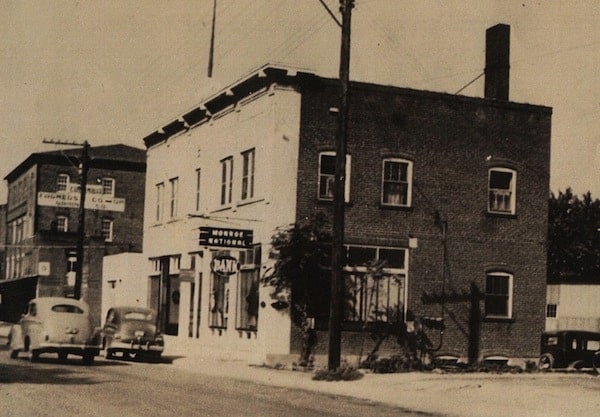Armed bank robbery remains part of Columbia folklore

A photo of Monroe National Bank in the late 1930s.
It was business as usual at Monroe National Bank in Columbia on Tuesday, Feb. 7, 1951.
Viola Frank, bookkeeper and teller, would soon welcome her first child into the world and was helping out while the bank trained someone to take her place.
The bank had closed for the noon hour, as usual, and Frank had just returned from lunch with her husband.
Viola Muskopf and Catherine Descher returned to their places at the teller windows. Assistant cashiers Ruth Kuergeleis and Lester Deffenbaugh had resumed work at their desks and bank president E. L. Rauch was wrapping up from a previous meeting of bank officials. Head cashier Arthur Wink was assisting customer Mattie Jewel Ross with an income tax form in an office nearby.
Frank had already counted the deposit of Harry Reichert — the only customer in the lobby at the time — and was preparing to enter the amount into his savings account booklet.
Suddenly, things changed.
The clock on the wall read 1:07 p.m., as three men entered the lobby. One stayed at the door as a guard while another with a gun leapt over the counter through an open teller window — the only one without a glass partition. The third man, carrying a pistol, eventually made his way behind the counter also.
Frank recalls one of the teller windows in the recently remodeled bank had been left without the glass partition. This helped older customers who couldn’t hear well through the small opening in the partitions. At one time, the windows had vertical bars in front of them.
“I saw the gunman put his foot up on the counter and grab hold of the brass posts that flanked each window. In one of his hands was a pistol. Another man was behind me in a jacket that hit somewhere between his waist and his knees. When he opened that coat, I saw he had a sawed-off shotgun and I heard the click… When he told me to lay down on the floor, I did it.”
Both Patrick Kane, the ringleader, and Ollie Gene Embry, a man of 22 already with an eight-year criminal background, worked together to gather bank employees and take them to the lobby area. James McAllister held the shotgun and stood guard at the door of the bank.
Rauch was led out to the lobby area. Aged 72 and suffering from severe arthritis, he walked with the support of two canes.
Deffenbaugh had risen from his desk to join other employees being taken to the lobby. He was told to “stay here, we need you.”
“When we all got out to the lobby, they told us to get on the floor face down. I could hear the guy who had jumped over the counter marching Mr. Deffenbaugh around back there. It was hard to see anything as the glass was frosted,” said Reichert.
Rauch pleaded with the gunmen to not make him get down on the floor due to his condition. The criminals were without pity, and Rauch was forced to join the others.
Meanwhile, Bertha Collette entered the building to make a deposit. She saw the guard at the door and began backing away. “He showed his gun to her and told her to stay,” Reichert remembers. “She was scared. They took her purse and took the money she had in it.” The amount of money came to $42.
Deffenbaugh was at the mercy of Kane as he directed him to the time-locked safe, all the while pointing a gun at the back of his head. From the safe, the robbers collected $8,855.
After obtaining the key to open the night depository, Deffenbaugh told the gunmen the depository had an alarm on it.
“Don’t let it go off,” was Kane’s reply.
According to Frank, others in the lobby could hear the conversation. All of them were aware of how many times the alarm had accidentally gone off when it was being opened. It was apparently very finicky and had to be opened “just so.”
“The alarm would ring in Weilbacher’s department store next door. Then, Mr. Weilbacher would usually come over and stick his head in the door to see if everything was okay. He was used to it being a false alarm. We were so worried the alarm would sound and the same thing would happen,” Frank said.
Both Frank and Deffenbaugh were near the alarm buttons during the robbery and could have easily triggered them.
“I think we were both afraid that someone would wind up getting hurt,” she stated.
Just as the depository was opened, the telephone began to ring.
“I turned around quickly and (Kane) said, ‘That’s just the telephone,'” recalled Deffenbaugh in his report. Meanwhile, the other gunmen had obtained information the main vault was in the basement. They would go there next.
Embry, the other pistol-toting gunman, asked Kane what they would do now as the phone continued to ring. Apparently, the initial plans of the robbers changed abruptly.
After 10 minutes, the gunmen left. Originally intending to stay longer, they apparently had plans to bind all the employees with tape and had already bound the ankles, wrists and taped the mouth of Viola Frank.
“I thought they might have intended to take me as a hostage. Later, I knew I had been the first one they started with and they would have bound everyone else eventually. The telephone ringing caused them to leave sooner than they had planned,” Frank recalls.
The thieves ended up dumping cash drawers and loot from the safe into emptied waste cans. With the money they took from Reichert and Collette, the quartet made off with nearly $9,000.
After staying silent for some time and listening for the motor of the getaway car, the bank was immediately locked and authorities were contacted. Two FBI agents were quickly dispatched to piece together the story.
The thieves, driving a stolen car, headed west on Locust street and sped down Rapp Avenue past the high school and grade school building, skillfully spreading roofing nails over the road. The Monroe County Clarion reported that the nails were spread evenly from one side of the street to the next and how the robbers were able to execute this remains a mystery and is possibly “the secret of the bandits.”
Turning east on Cherry Street and heading swiftly out to Quarry Road, the bandits weighted down the gas pedal of the first car, running it into a ditch. They got into another car and headed for Millstadt, where they transferred to a 1949 Buick, driving on to Belleville.
According to Reichert and newspaper accounts, the driver of the getaway car, 18-year-old Frank Daubauch, was later picked up by East St. Louis detectives who happened to notice him driving a new car through town. Well aware of the criminal past of the youth, the two stopped him and asked him to ride to the police station.
As they were driving to the station, Reichert recalls a detective apparently asked Daubauch if he “had anything to do with that bank robbery down in Columbia earlier that day.” Daubauch answered he had not robbed a bank, but had “just drove the car.”
The entire story was soon pieced together and the three other robbers were named. Police were dispatched to be on the lookout for them.
Newspaper accounts the next day reported how Kane, along with his wife and two small children, and McAllister met at the George Washington Hotel in St. Louis, waiting for Embry to join them and divide the stolen cash.
When Embry entered the hotel, he noticed a man reading a newspaper in the lobby. Convinced the man was a detective, Embry fled. Kane and McAllister were arrested a few minutes later. Kane’s wife, who had taken part in a nightclub robbery a few days before, was also arrested.
“I later asked about those two little kids and was told they were put in foster homes,” Reichert remarked. “I felt real bad about that.” Kane and his wife had purchased a new car and train tickets to Chicago prior to checking into the hotel.
Reichert and others were asked to travel to both East St. Louis and St. Louis to identify the suspects.
Embry continued to elude police, and by July had been placed on the FBI’s Most Wanted List. He was arrested in August after obtaining a job as a filling station attendant. He was working one day on the radiator of an FBI agent.
Reichert, Frank and Descher, a patient at a local nursing home, are the only surviving members of the group who witnessed the robbery. Deffenbaugh’s family has kept newspaper clippings and his typewritten statement to the FBI.
Reichert and Frank recall the incident as a startling episode in their lives and one that made an impression.
“I was upset and shaken up, but it really didn’t change the way I lived my life,” Frank recalls.
She was, however, able to relate to the words of Reichert, who said “it was hard to have that small-town trust for a while after the robbery. For a long time, I was always aware of my surroundings and if anyone looked out of place — especially when I went to the bank.”






